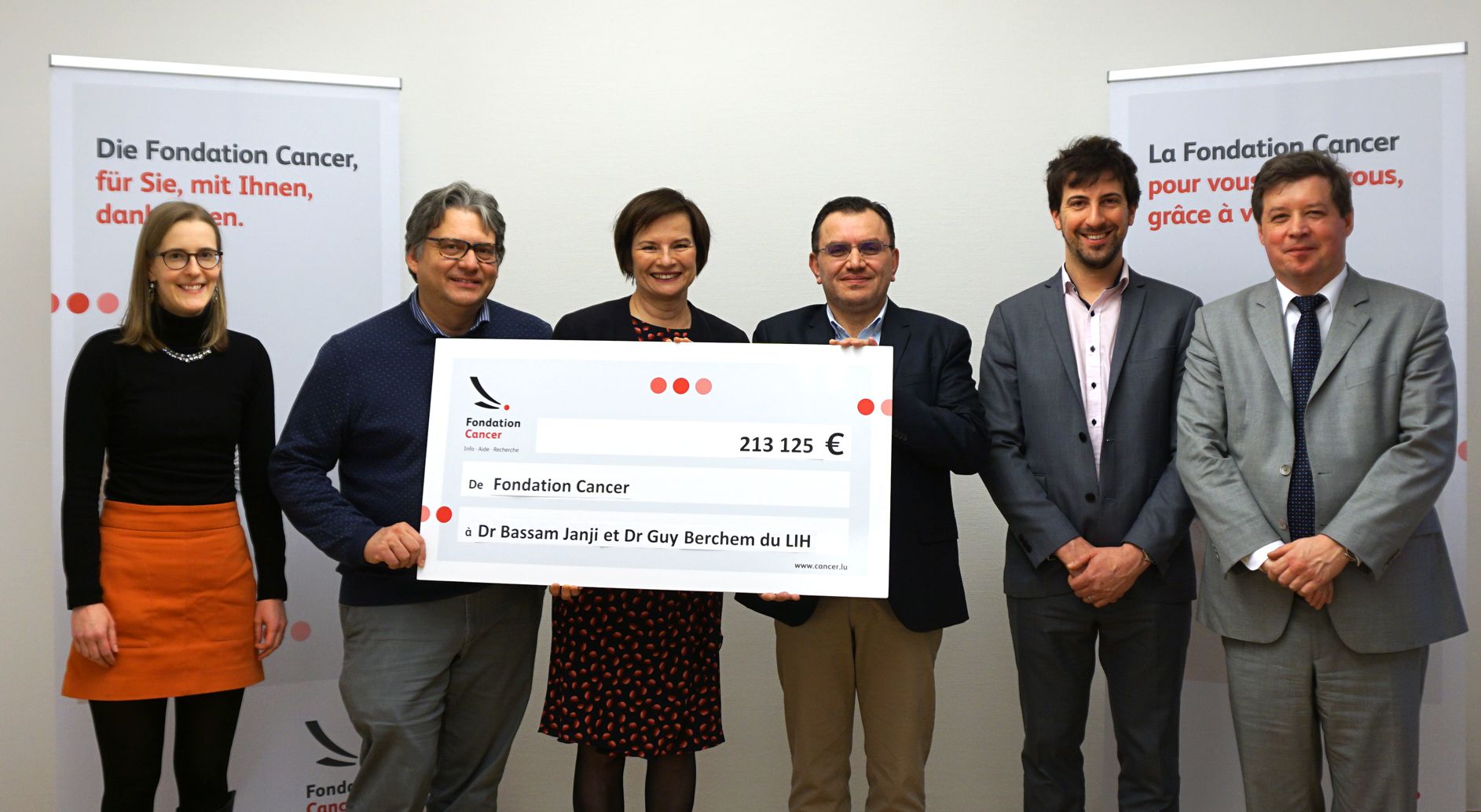The Luxembourg Cancer Foundation “Fondation Cancer” and the Luxembourg National Research Fund (FNR) are jointly funding a research project on cancer immunotherapy at LIH in the framework of the FNR’s CORE programme.
On 16th January 2019, Lucienne Thommes, Director of the Cancer Foundation, presented a cheque of 213,125 Euros to LIH researchers Dr Bassam Janji and Dr Guy Berchem in the presence of Dr Marc Schiltz, Secretary General of the FNR. The FNR matches the Cancer Foundation’s amount and has also committed 213,125 Euros to the project. Indeed, the FNR and the Cancer Foundation have concluded a collaboration agreement to develop and intensify their cooperation to support high-level cancer research projects that are in line with the National Cancer Plan.
The project “Improving T-cell and macrophage immune checkpoint blockades, combining autophagy inhibitors”, or shortly COMBATIC, aims to improve the effectiveness of immune checkpoint inhibitors in cancer patients who have not previously been eligible for immunotherapy.
Utilising the immune system to attack cancer cells
Unlike other cancer treatment strategies, immunotherapy is a revolutionary treatment that does not directly target the tumour, but acts primarily on the cancer patient’s immune system to enable it to recognise and attack cancer cells. Indeed, cancer cells manage to thwart the body’s defence mechanisms so that they are not recognised by immune cells as abnormal cells: they acquire shields, called immune checkpoints, which protect them and neutralise the action of immune cells.
Immunotherapy, particularly those based on immune checkpoint inhibitors, has led to considerable progress. A durable response has been achieved in patients with metastatic skin melanoma (skin cancer) resistant to standardised treatments such as chemotherapy. Immunotherapy has also yielded very encouraging results for the treatment of lung cancer and relapsing Hodgkin’s lymphoma as well as in some ear/nose/throat (ENT), colon, bladder, kidney and ovarian cancers.
A real therapeutic feat on certain patients
However, the full and sustained efficacy of immunotherapy is limited to a proportion of cancer patients. Thus, in the case of melanoma, only 38% of cases benefit from a complete and lasting cure, while nearly 60% of patients derive no therapeutic benefit from it.
It is well known that patients with tumours that are poorly or not infiltrated by immune cells, called “cold tumours”, do not benefit from any therapeutic advantage. In contrast, patients with tumours pre-infiltrated by immune cells, called “hot tumours”, generally benefit from a sustained immune response. Thus, this therapy can be particularly effective in awakening inhibited immune cells and/or strengthening those that are exhausted in hot tumours.
Reprogramming cold tumours to hot tumours
In recent years, the Laboratory of Experimental Cancer Research, led by Dr Guy Berchem and Dr Bassam Janji, has launched a vast research programme on immunotherapy aimed at improving the efficacy of immune checkpoint inhibitors, particularly in patients with cold tumours that are not eligible for this treatment. Their pioneering research has identified a target in tumours whose blocking allows the immune landscape of cold tumours to be reprogrammed. This reprogramming consists in inducing a massive infiltration of immune cells and making tumours sensitive to immunotherapy based on immune checkpoint inhibitors.
The COMBATIC project aims to evaluate the ability of pharmacological molecules to induce pre-infiltration of immune cells in experimental preclinical models of melanoma and colon cancer that are not eligible for immunotherapy. The project also plans to test the therapeutic benefit of a combination of these molecules with immune checkpoint inhibitors. The ultimate goal of this innovative project is to provide a therapeutic strategy capable of reprogramming the immune landscape from cold tumours not eligible for immunotherapy to hot tumours pre-infiltrated by immune cells.
A press release from the Cancer Foundation is available in French and German.
Watch a video in which Dr Bassam Janji explains his research project (in French).

From left to right: Maiti Lommel (Public Health Professional, Cancer Foundation); Dr Guy Berchem (Head of Unit, LIH / CHL), Lucienne Thommes (Director, Cancer Foundation); Dr Bassam Janji (Deputy Head of Unit, LIH); Dr Sean Sapcariu (Programme Manager, FNR) and Dr Marc Schiltz (Secretary General, FNR).
Copyright: Cancer Foundation
